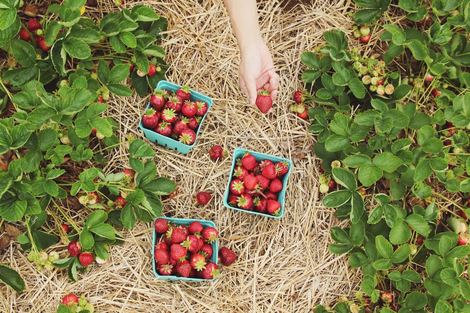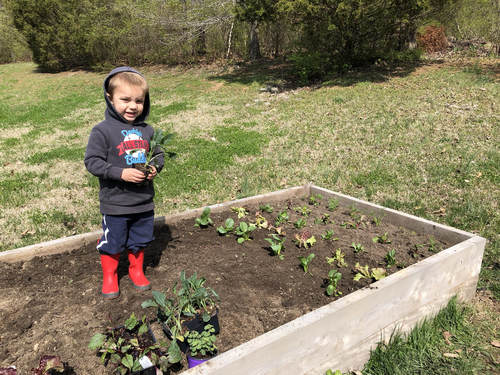|
,Spring is almost here! And in the plant world, that means full bloom! As I am planning new additions to my garden and spending more time perusing the farmers market now that the weather is warming, it got me thinking a lot about how much of an impact these two habits have become in my life. As a dietitian who has counseled hundreds of patients suffering from chronic symptoms and as someone who has personally gone through my fair share of health challenges, I have developed a strong passion for not just healthy food that will nourish the body, but also sustainable, locally sourced food. By implementing these not so common tips, you too may begin to build a stronger connection with the food that you eat, resulting in improved health all around. Get To Know Your Local Farmers The benefits to both the consumer and producer are huge! With the growth in the organic movement, more people are recognizing the importance of chemical-free produce and are taking an interest in what farmers are using on their crops and how they are raising their livestock. When you buy directly from farmers, you are supporting both small, independent farms and your community, and in doing so, you learn where your food comes from and how it is produced. The seasonal fruits and veggies that you will find at the market will be extremely fresh and tastes better too! You don’t get this luxury by visiting your local supermarket. You’ll soon catch yourself leaving those mealy, bland grocery store tomatoes behind once you discover new seasonal treats like Chocolate Cherry and Cherokee Purple tomatoes that are bursting with flavor! When I first started going to farmers markets, I would go casually once or twice a month. But over time, and as I began to talk to the farmers and learn about their family and farming practices, I found myself going every weekend in rain, snow, or shine to get the freshest and tastiest produce available. It’s also therapeutic, in a way, knowing where my food comes from, the nourishment that we receive from it, and the support that I am providing to these hard-working families. So where does the large majority of our food even come from? Factory farming is where the majority of the meat and dairy in the U.S. is produced. Factory farming is an operation that raises large numbers of animals for food. Because many of these animals are intensely confined, they have to give them antibiotics in their feed so they can stay “healthy” and not wipe out the entire livestock. The animals are also given antibiotics to help them grow. (1) And they are fed a diet that is grain based and most often genetically modified, which is not their normal diet and can make them sick. What does this translate to us? When you consume animal products that have been raised on a foreign, antibiotic enriched diet, this chronic low dose exposure has the potential to damage our microbiome. Support Your Microbiome The human microbiome consists of trillions of microbes that inhabit our bodies, and imbalances in the microbiome have been associated with cancer, autism, asthma, diabetes (type 1 and 2), inflammatory bowel disease, multiple sclerosis, as well as many other diseases. (2) It is well known that antibiotics alter the gut microbiome, and the alterations that occur can last months to years. (3) Overexposure to antibiotics both in medical use and from the consumption of animal products that were raised on antibiotics has also been linked to the rise in antibiotic-resistance. One study found that the abundance in antibiotic resistance genes were highest in the antibiotics that have been on the market the longest as well as those that had been approved for animal use. (1) Avoid Chemicals Industrial agriculture uses high amounts of toxic pesticides and fertilizers that pollute the environment, compromise ecosystems, and alter our gut microbiome. Synthetic chemicals that are used on crops are a global concern as these endocrine disrupting chemicals can interfere with our delicate hormone balance resulting in both developmental and reproductive abnormalities. (4) There is also growing concern regarding the impact that they can have on our gastrointestinal tract function. A study conducted on rats found that exposure to low doses of pesticides caused morphological changes in the intestinal epithelium, increased intestinal permeability and bacterial translocation, and was associated with an imbalance in the intestinal microbiota. (5) When purchasing produce, you will want to look at the Dirty Dozen list, which is a list composed by the Environmental Working Group where they ranked 48 items from worst to best for pesticide residue load. Strawberries, spinach, nectarines, and apples are some of the worst ones that are at the top of the list, so you will want to buy organic to avoid high pesticide exposure. Others like sweet corn, avocados, pineapples, and cabbage are at the bottom of the list meaning they have lower amounts of pesticide residue. I recommend buying and growing organic as much as possible, but if you’re on a budget or unable to get organic, this list is great to help you prioritize your purchase. (6) Get More Bang For Your Buck Farmers markets allow you to ask farmers how they raise their animals and how they grow their crops without having to just rely on the certified organic seal or grass-fed label. You’ll find many sustainable farms that don’t use pesticides, but they are not certified organic. Talk with the farmers and ask them if they use chemical fertilizers or pesticides and how they deal with pests. Ask them about the diet of their livestock and if they’re raised on pasture or given antibiotics. Purchasing antibiotic-free, grass-fed, pasture-raised meat and eggs, as well as pesticide-free produce, are just a few ways that you can control and limit the amount of toxins that you are exposed to as well as a way to get more nutrition from the food that you eat. Pastured animal products have been shown to have a superior nutrient profile compared to their grain-fed counterparts. Research shows that grass-fed beef is lower in total fat, and higher in omega 3 fatty acids, conjugated linoleic acid (CLA), Vitamins A and E, and the antioxidants glutathione and superoxide dismutase. (3) My little one helping me in the garden Grow Your Own
There are numerous benefits to growing your food. It saves you money- especially on organic produce, allows you to eat in season, increases your intake of fruits and vegetables, guarantees that your food is fresh, and it can be a valuable tool that helps you to teach your children healthy nutrition and eating habits. I love growing my food and having it easily available. A little effort on the front provides a healthy abundance of food that lasts all season. Get The Most Nutrients Out of Your Food When you eat food that has been picked fresh from your garden, or that was grown locally, you are provided with one of the richest sources of nutrients and beneficial microbes that can be offered. Most of the food that we eat is shipped long distances before it reaches our plate and is picked before it is ripe. Farming practices specifically related to soil fertility have a big impact on the nutritional quality of the produce that ends up in your mouth, but other factors include storage and temperature. For instance, research done on stored spinach showed higher loses in folate and carotenoid content when stored at temperatures of 50 and 68 degrees. The same loses were shown with cooler temperatures at 39 degrees and longer storage times at 8 days. (7) Gardening Made Easy You don’t have to be an experienced gardener either nor do you need a lot of space. Raised bed gardens are my favorite way to grow because it cuts down on weeding and makes planting and tending to the soil so much easier than having to amend existing soil. If you’re tight on space, use pots to plant strawberries, tomatoes, peppers, cucumbers, green beans, zucchini, squash, and a wide assortment of herbs. For trailing plants use cages, trellises, or stakes to allow them to climb. However, the one thing you do need to have is enough sun. If you live in a shady spot, purchase from your local farmers as you will still be able to reap the benefits as if you were growing it your own. References
|
Hello!I'm Meagan Reynolds- a certified functional medicine practitioner and dietitian located in Nashville, TN. After overcoming my own health challenges with hypothyroidism, I was motivated to create my own practice where I help women reverse their thyroid, gut, and hormonal issues so they can reclaim their health. Archives
July 2023
Categories
All
|




 RSS Feed
RSS Feed